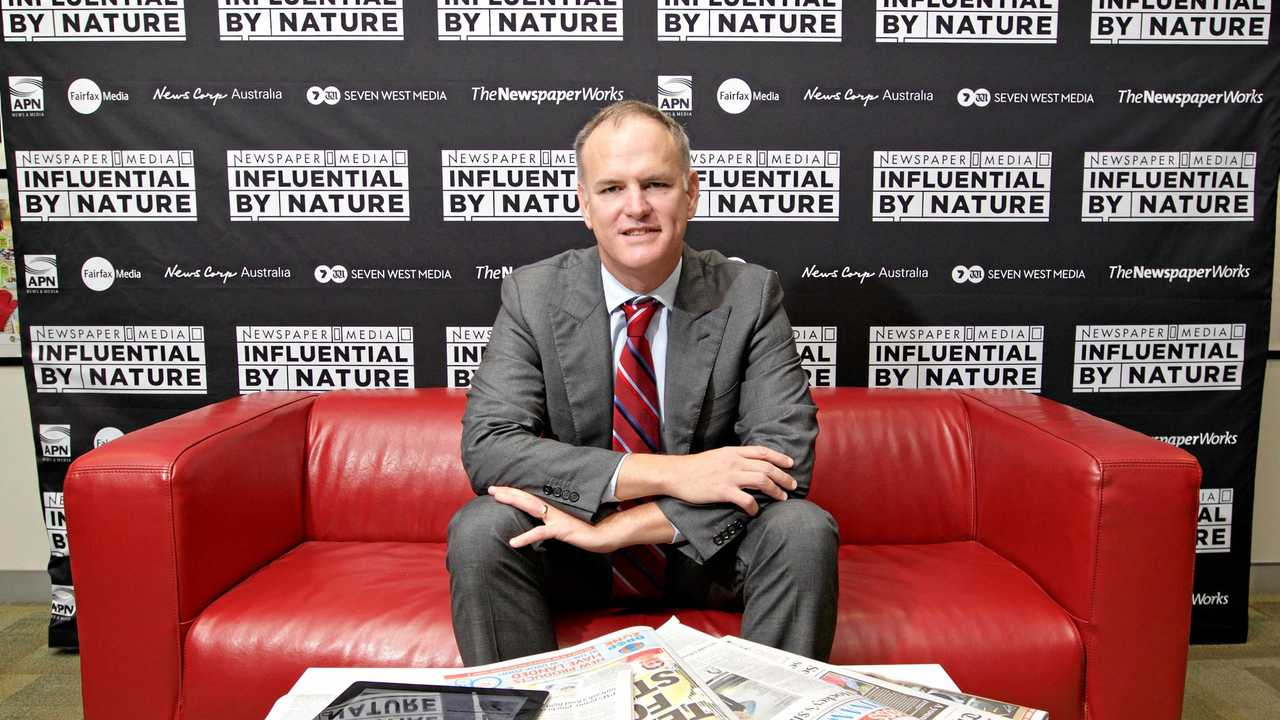Inquiry into Google, Facebook fundamental to all business
The cost of "free" information services is the collection of highly personal data.

Opinion
Don't miss out on the headlines from Opinion. Followed categories will be added to My News.
THE business model for the news industry is now in a fragile state, with the digital platforms preventing publishers from best positioning their operations for the future.
This is why the ACCC's world-first inquiry into platforms such as Google, Facebook and Apple is of fundamental importance not just for media but all businesses.
Google and Facebook in particular like to highlight the "good work" they are doing for journalists and publishers. But I would urge everyone to look at the reality.
The Media, Entertainment and Arts Alliance has estimated that since 2011, a quarter of all journalists in Australia have been made redundant. The reduction in advertising revenues and the digital platforms' reluctance to allow publishers to create new subscription models on their terms have created immense challenges.
News Corp Australia's submission to the ACCC forensically dissects how the platforms' market power has made them "unavoidable trading partners" for publishers who are, in effect, trapped and hurt by their anti-competitive practices.
In Australia, Google has 95 per cent of the search engine market and 50 per cent of the mobile device operating system market; Facebook has 80 per cent of the social media market; and Apple around 40 per cent of the mobile device market.
As publishers transition to digital, platforms are increasingly using this dominance to stop publishers competing on their merits.
They can decide what you see, when you see it, what you don't see, what they know about you, the prices advertisers pay, where ads appear, and make or break businesses - with too little recourse for those affected.
The potential to damage creation, distribution and consumption of news and cause widespread consumer harm is profound. These impacts include:
Consumers - Reducing choice and diversity of original news and journalism, undermining Australians' ability to assess the integrity of news sources, and prioritising unreliable content. Consumers are also facing significant incursions on privacy - as demonstrated by Facebook's Cambridge Analytica scandal - with the platforms harvesting increasing amounts of personal data for commercial purposes;
Publishers - Subverting online subscription and advertising revenue streams which is undermining the news industry's sustainability as a private enterprise, leading to widespread cost-cutting and reduced incentives to invest in quality journalism; and
Advertisers - The platforms' dominance, particularly with programmatic advertising, and control over the advertising supply chain is leading to less choice and higher prices. At the same time, advertisers too often find their brands placed in unsafe online environments, such as alongside extremist or other unsavoury sites.
These are important issues for our society: a strong media is a cornerstone of democracy.
The media plays a vital role in informing Australians of news and information, providing analysis, different perspectives, public debates and advocating for change.
Publishers come from, and are responsible to, their communities; their journalism is gathered in an ethical manner, fact checked, and accountable to the public.
In contrast, digital platforms are far removed from local communities, unresponsive to criticism and unaccountable for errors which have spread false, harmful content.
Australians are now learning there is a significant cost to all of this. The "free" services which made the platforms so popular and rich are anything but.
They lure in consumers with "free" services but the cost is the collection of highly personal data to profit from and use of algorithms deciding what content they see.
This is leading to 'echo-chambers' where Australians are exposed to less diversity and a narrower cast of opinions tailored to their existing views and values.
Further, the platforms have made it harder to identify the news brand publishing an article or whether it's the original creator, resulting in a proliferation of fake news.
While 'free' services superficially appear beneficial to the public, they have the potential to create negative effects on both competition and consumer welfare.
The platforms are in fact hugely profitable corporate entities driven by selling advertising and harvesting vast amounts of user attention and personal data.
They are using their market power to entrench their role as intermediaries between publishers and consumers and to ensure they remain the gateway to the internet.
Their aim is to arrogate content from publishers and retain users in their own ecosystems since every consumer lost to another website, even publishers, is ultimately lost revenue for them: less data is harvested, less advertising is sold.
Meanwhile, publishers are coerced into accepting terms of trade dictated by digital platforms because to not be on these platforms is to effectively be invisible online.
Publishers who seek to resist the terms of access to a platform are punished by demotion or exclusion, resulting in immediate deterioration in referral traffic. Those who comply with the terms are experiencing intense pressure on margins.
Now, the platforms' development of new technology has delivered them control of the supply of and demand for digital advertising, giving publishers have little alternative but to outsource the sale of their ad inventory to the platforms. Google and Facebook essentially set digital advertising market prices.
This serves to increase the market power of the platforms by creating a walled garden or closed market in their control and foreclose competition from publishers.
At the same time, they subvert publishers' opportunities to access valuable data on their readers, keeping them at a competitive disadvantage and restricting their ability to grow new subscription, content and advertising revenue offerings.
In terms of the ACCC inquiry, News Corp has not formed a final view as to whether government intervention is required to address the platforms' negative impacts.
One option is to establish an Algorithm Review Board to analyse and remedy algorithmic distortions of competition and designate the digital platforms as publishers/broadcasters to remove their incentives to distribute lower quality content.
What is clear, however, is that if local publishers are unable to survive as a result of the platforms' anti-competitive practices, then all Australians will be the losers.
Michael Miller is Executive Chairman - News Corp Australasia
Originally published as Inquiry into Google, Facebook fundamental to all business






